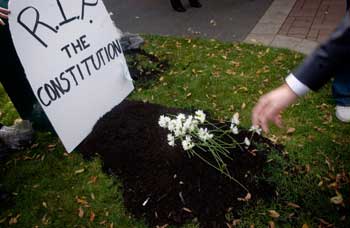 Many people want strong centralized authority running things.
Many people want strong centralized authority running things.
They have an agenda.
Things to get done.
Needs.
Of course, they want to control that centralized authority. That way, they can stop other people from advancing their agenda – agendas they deem less desirable.
Inferior.
Dangerous.
With a strong centralized power structure, things devolve into a political version of the World Wrestling Federation, each character scrapping, clawing and banging opponents over the head with chairs.
The ultimate prize: power.
But wiser heads have long recognized the danger of unrestrained power. As Lord Acton observed, “Power corrupts and absolute power corrupts absolutely.”
Of course, those in charge seldom concern themselves with such trivial matters. But for those on the outside – minorities – checks on power can literally become a matter of life and death.
Consider the Armenians under the thumb of the Ottoman Empire.
The rule of law makes exercising power difficult. This is a good thing. It protects minorities and prevents majorities, concerned only with advancing their interest, from trampling basic individual rights along the pathway to their utopian dreams. Of course, limits on power cause centralizers a great deal of consternation. Consider President Obama bemoaning the difficulty of moving his agenda forward during his 2011 State of the Union Speech.
It will be harder because we will argue about everything. The costs. The details. The letter of every law. Of course, some countries don’t have this problem. If the central government wants a railroad, they build a railroad, no matter how many homes get bulldozed. If they don’t want a bad story in the newspaper, it doesn’t get written.
And if they want to kidnap you and lock you up for the rest of your life, they just drag you off.
Thus, the need for a Constitution limiting the government’s power.
Even Obama tacitly admitted he didn’t want to live in a system absent the rule of law. But proponents of centralized power do want to minimize the roadblocks written constitutions create. Knowing they can’t do away with them completely, they figure out workarounds.
In the United States, the notion of a “living, breathing” constitution serves that purpose. When necessary, centralizers can point to the document as a restraint on power to protect their interests. But through their own interpretations, they find the flexibility they need to “get things done.”
One website calls this “informal amendment.”
Another way the Constitution’s meaning is changed is often referred to as ‘informal amendment.’ This phrase is a misnomer, because there is no way to informally amend the Constitution, only the formal way. However, the meaning of the Constitution, or the interpretation, can change over time.
But this is not a proper way to understand a legal document. In contract law, the parties’ understanding at the time of the agreement dictates its meaning. The bank can’t just come along and say, “Well, dear customer, we’re changing the interest rate on your mortgage because times have changed, and we don’t see the meaning of the contract the same way anymore. Please remit an extra $200 a month beginning with your next payment.” The customer would certainly protest, “That’s not what I agreed to.”
That meaning of a contract doesn’t change unless both parties come to the table and agree to new terms. The Constitution provides an amendment process to serve that purpose.
Of course, those who want to use centralized power to stuff their agenda down everybody’s throat began advancing the “evolving, living-breathing document” theory early in the America’s history. James Madison spoke out strongly against this tendency in an 1824 letter to Richard Henry Lee.
I entirely concur in the propriety of resorting to the sense in which the Constitution was accepted and ratified by the nation. In that sense alone it is the legitimate Constitution. And if that be not the guide in expounding it, there can be no security for a consistent and stable, more than for a faithful exercise of its powers. If the meaning of the text be sought in the changeable meaning of the words composing it, it is evident that the shape and attributes of the Government must partake of the changes to which the words and phrases of all living languages are constantly subject. What a metamorphosis would be produced in the code of law if all its ancient phraseology were to be taken in its modern sense!
In other words, the “informal amendment” leads to chaos because it ultimately digs the foundation out from under the rule of law and serves to remove all restraints from so-called authority.
And history teaches us that allowing centralized authority to exercise unrestrained power leads to really bad things.
A living, breathing constitution is ultimately a dead constitution.
- Utah’s Step-By-Step Strategy in Support of Sound Money - April 9, 2024
- Utah’s Step-By-Step Strategy Against the Surveillance State - April 1, 2024
- How the Federal Reserve Backstops the Biggest Government in History - February 21, 2024

